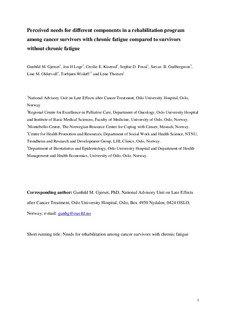| dc.contributor.author | Gjerset, Gunhild Maria | |
| dc.contributor.author | Loge, Jon Håvard | |
| dc.contributor.author | Kiserud, Cecilie E. | |
| dc.contributor.author | Fosså, Sophie Dorothea | |
| dc.contributor.author | Gudbergsson, Sævar Berg | |
| dc.contributor.author | Oldervoll, Line Merethe | |
| dc.contributor.author | Wisløff, Torbjørn | |
| dc.contributor.author | Thorsen, Lene | |
| dc.date.accessioned | 2018-02-27T13:41:04Z | |
| dc.date.available | 2018-02-27T13:41:04Z | |
| dc.date.created | 2017-06-05T13:23:12Z | |
| dc.date.issued | 2017 | |
| dc.identifier.citation | Acta Oncologica. 2017, 56 (2), 245-253. | nb_NO |
| dc.identifier.issn | 0284-186X | |
| dc.identifier.uri | http://hdl.handle.net/11250/2487437 | |
| dc.description.abstract | Background: Knowledge about the user’ needs is important to develop targeted rehabilitation for cancer patients with chronic fatigue (CF). The aims of the study were to examine prevalence of CF in cancer survivors attending an one-week inpatient educational program (IEP) and to identify characteristics of those with CF. Further to examine the perceived needs for different components in a rehabilitation program, need of complex rehabilitation (at least two components) and aspects of health-related quality of life (HRQoL) among survivors with CF versus those without CF.
Material and methods: Cancer survivors ≥18 years, diagnosed with different types of cancer within the last 10 years and attending a one-week IEP were invited to this cross-sectional study. CF was assessed by the Fatigue Questionnaire, perceived needs by asking a question about needs for different components in a rehabilitation program and HRQoL was assessed by The Medical Outcomes Study Short Form 36.
Results: Of 564 participants, 45% reported CF. Breast cancer, mixed cancer types (including small groups with different cancer types) and comorbidities increased the risk for having CF. Compared to participants without CF, the participants with CF reported more frequently need for physical training (86% vs. 65%, p < 0.001), physiotherapy (71% vs. 55%, p < 0.001) and nutrition counseling (68% vs. 53%, p = 0.001). Among participants with CF, 75% reported need for three or more components whereas 54% reported need for the same number of components among those without CF (p < 0.001).
Conclusion: Almost half of the cancer survivors attending the IEP had CF. Physical training, physiotherapy and nutrition counseling were the most frequently reported needs and significantly more often observed in participants with CF than without CF. A higher percentage of those with CF reported need for a complex rehabilitation compared to those without CF. More research is necessary to obtain more knowledge to further make targeted programs to better match cancer survivors’ needs. | nb_NO |
| dc.language.iso | eng | nb_NO |
| dc.publisher | Taylor & Francis | nb_NO |
| dc.title | Perceived needs for different components in a rehabilitation program among cancer survivors with chronic fatigue compared to survivors without chronic fatigue | nb_NO |
| dc.type | Journal article | nb_NO |
| dc.type | Peer reviewed | nb_NO |
| dc.description.version | acceptedVersion | nb_NO |
| dc.source.pagenumber | 245-253 | nb_NO |
| dc.source.volume | 56 | nb_NO |
| dc.source.journal | Acta Oncologica | nb_NO |
| dc.source.issue | 2 | nb_NO |
| dc.identifier.doi | 10.1080/0284186X.2016.1266091 | |
| dc.identifier.cristin | 1474061 | |
| dc.description.localcode | This is an [Accepted Manuscript] of an article published by Taylor & Francis in [Acta Oncologica] on [11 Jan 2017], available at https://www.tandfonline.com/doi/full/10.1080/0284186X.2016.1266091 | nb_NO |
| cristin.unitcode | 194,65,20,0 | |
| cristin.unitname | Institutt for samfunnsmedisin og sykepleie | |
| cristin.ispublished | true | |
| cristin.fulltext | original | |
| cristin.fulltext | postprint | |
| cristin.qualitycode | 1 | |
